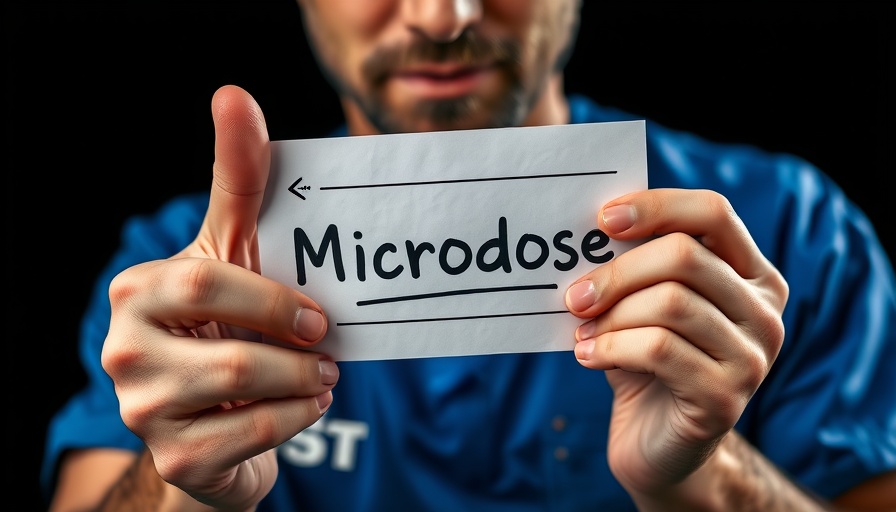
The Microdosing Movement: A New Approach to GLP-1 Agonists
As a growing trend in the health and wellness community, microdosing GLP-1 agonists like semaglutide is drawing attention, especially from women over 40. Not only are these medications known for their ability to help manage blood sugar and promote weight loss, but they are also being used in smaller doses to potentially enhance overall well-being without the side effects commonly associated with higher doses.
In 'Women Over 40 Are Microdosing Weight Loss Drugs: Here’s Why!', the discussion dives into the emerging trend of microdosing GLP-1 agonists, exploring key insights that sparked deeper analysis on our end.
What Exactly Are GLP-1 Agonists?
GLP-1, or glucagon-like peptide-1, is a hormone that plays a crucial role in regulating appetite and blood sugar levels. By mimicking this hormone, medications like Ozempic and Mounjaro have been prescribed to assist with weight management, particularly for those dealing with obesity and type 2 diabetes. Despite their effectiveness, some patients have reported discomfort due to side effects such as nausea and digestive issues when taking standard doses.
Why Microdosing Might Be Beneficial for Women in Midlife
Recent conversations among healthcare professionals suggest that microdosing GLP-1 agonists can yield positive outcomes, particularly for women in pre-menopause and post-menopause. Microdosing involves taking only a fraction of the standard dosage, which may reduce side effects while still providing benefits like better appetite regulation, improved energy levels, and reduced brain fog.
Women in midlife often deal with hormonal weight gain and insulin resistance, and microdosing might ease some of these burdens. A recent study noted in the 2023 review published in Nature Metabolism shows that even low doses of these agonists can decrease markers of inflammation, potentially addressing issues like joint pain and mood swings associated with fluctuating hormones during this stage of life.
Understanding the Risks Involved
While microdosing appears appealing, there are important risks to consider. Although side effects may be milder, there is still a chance of experiencing issues such as nausea or constipation, depending on individual responses. Moreover, incorrect dosing is a risk since microdosing is not formally recognized in medical guidelines. It’s crucial that this approach be supervised by clinicians familiar with both the medications and the patient’s health history.
Some patients might find microdosing ineffective, especially if they need to lose more significant weight. Hence, it’s not a one-size-fits-all solution and might not work for everyone.
Finding the Right Provider for Microdosing
If you are considering microdosing GLP-1 agonists, finding a knowledgeable clinician is imperative. Qualified practitioners include board-certified obesity specialists, endocrinologists, or professionals in functional medicine who have a comprehensive understanding of metabolic health. Caution is warranted, as some providers, particularly in cosmetic surgery, may not possess the requisite knowledge for effective weight management strategies.
Tracking Your Progress for Optimal Results
When preparing for a consultation, having data on symptoms and goals can significantly aid your healthcare provider in tailoring a personalized approach. By documenting issues like cravings, brain fog, or fatigue, women can show the clinician where they seek relief, making the guidance more targeted and effective.
Microdosing as a Sustainable Change
Ultimately, microdosing GLP-1 agonists isn’t some miracle solution; it's part of a broader lifestyle adjustment. It serves better as a supportive tool to help with appetite control and inflammation, rather than as a major weight-loss technique. Beneficial outcomes, such as feeling less inflamed and having more stable energy levels, can encourage healthier habits without the drastic side effects.
This approach empowers women to reclaim their wellness as they navigate the complexities of hormonal changes. Microdosing GLP-1s reflects a noteworthy shift in how we understand weight management, especially for women over 40, addressing issues that often go unnoticed.
If you're navigating hormonal changes and are curious about how microdosing may aid in your overall wellness, speak with a trusted healthcare provider to see if it aligns with your health goals.
 Add Row
Add Row  Add
Add 

 Add Row
Add Row  Add Element
Add Element 




Write A Comment